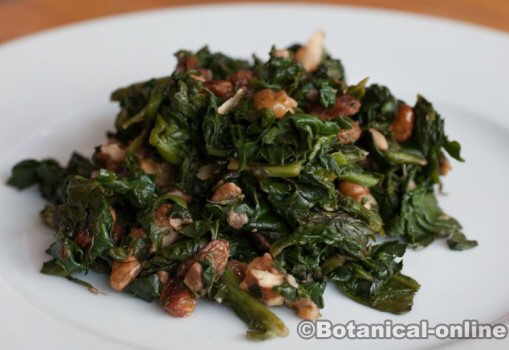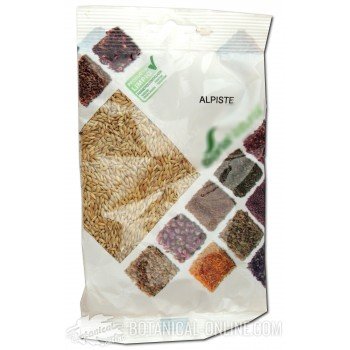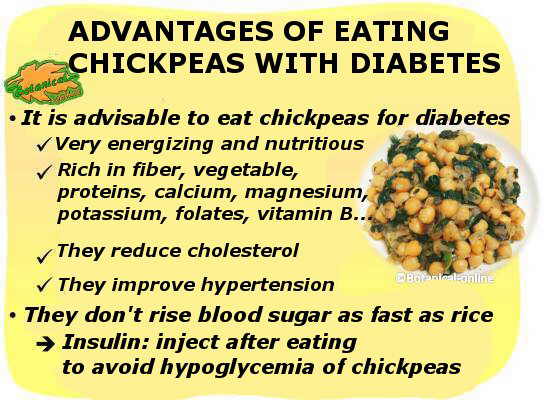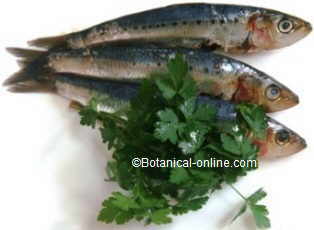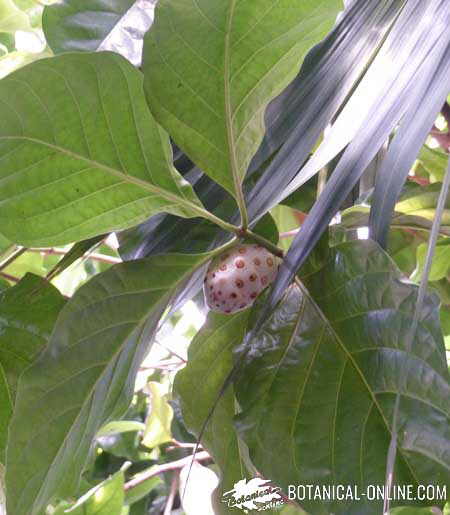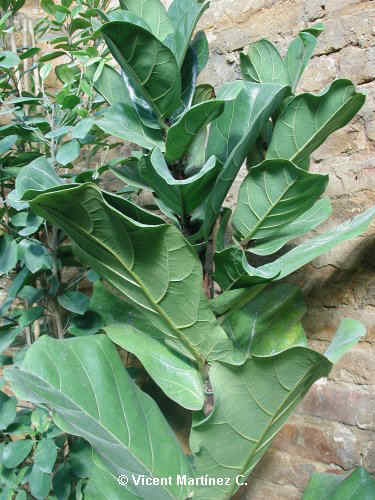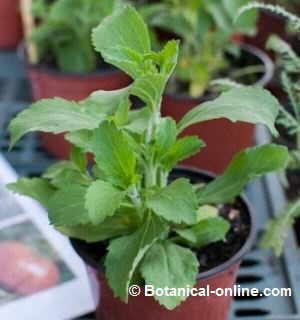Contents
- 1 MYTH ABOUT OXALATES AND KIDNEY STONES
- 2 Are oxalates responsible for stones in the kidneys?
- 3 What are oxalates and how are they related to kidney stones?
- 4 What foods have oxalates?
- 5 Eating food with many oxalates is the cause of kidney stones?
- 6 CAUSES OF STONES IN THE KIDNEYS
- 7 Factors that favor the formation of kidney stones
- 8 Causes of calcium oxalate stones in the kidneys
- 9 How many oxalates can you eat as a maximum?
- 10 Calcium oxalate stones in the kidneys from taking too many foods with a lot of calcium
- 11 Diseases that calcium oxalate stones produce
- 12 Oxalates and intestinal flora
- 13 Therefore, if we do not eat oxalates. will we reduce the risk of kidney stones?
- 14 Will eliminating oxalate-rich foods prevent kidney stones?
- 15 Why is it recommended to eliminate food with oxalates in case of stones?
- 16 Should I stop eating spinach if I have never had stones?
MYTH ABOUT OXALATES AND KIDNEY STONES
Are oxalates responsible for stones in the kidneys?
Have you ever heard that spinach has many oxalates? Well, it’s true. And for this reason, many readers ask us if it is also true that oxalates capture calcium and produce calcium oxalate kidney stones. This is the question or concern that the present article intends to answer.
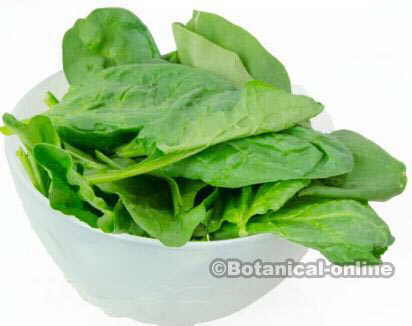
Photo of spinach, which are the richest foods in oxalates
Oxalates are components present in many vegetables. It has been proved that eating foods with many oxalates increases the renal elimination of oxalates, which is known as oxaluria. This is normal, since it serves to eliminate the oxalates that have been ingested.
When they are filtered by the kidneys they can precipitate and form calcium oxalate, which is deposited forming calcium oxalate stones in the kidneys.
If many foods with oxalates are found in the diet, the formation of calcium oxalate crystals and the appearance of calcium oxalate crystals in the urine or problems such as kidney stones are more likely, especially if there is a predisposition.
What foods have oxalates?
Most plant foods contain oxalates and it is almost impossible not to eat them. But observing a table of composition with the content of oxalates in food, we see that there are some foods, such as Swiss chard or spinach, which have many more oxalates than other vegetables.
- Most people can eat foods with oxalates normally, in principle, without any special precautions. Only people who have had stones or who have certain diseases should be more careful.
Eating food with many oxalates is the cause of kidney stones?
No. In most cases, the stones in the kidneys are composed of calcium oxalate (about 80% of cases), but these can be due to many causes. Normally, eating many foods rich in oxalates does not produce kidney stones.
CAUSES OF STONES IN THE KIDNEYS
Factors that favor the formation of kidney stones
In most cases, these stones are of unknown causes or could be the sum of various factors. In addition, there are other substances, besides calcium oxalate, which can be concentrated in the urine for various reasons and form stones.
First, one of the causes of kidney stones can be:
- Too concentrated urine
- Insufficient water intake
- Dehydration or excessive losses (sweating).
- Urine ph: The pH of the urine is also a factor to assess. If the urine is very acidic, it favors the precipitation of substances (urinary tract infections, acidifying diet, …)

Photo of sautéed spinach with walnuts
Causes of calcium oxalate stones in the kidneys
The consumption of many foods with oxalates (spinach, cocoa, Swiss chard, rhubarb, beet, coffee, etc.) may favor the deposit of calcium oxalate in the kidneys.
However, under normal conditions, the body is able to remove these calcium oxalate crystals in the urine, and there are usually other factors that favor the appearance of stones.Therefore, if a person has never had problems with stones, he can probably continue to consume the normal diet since his kidneys are perfectly capable of eliminating oxalates from the diet without problems.
How many oxalates can you eat as a maximum?
We can not determine the number of “maximum” or “normal” spinach, there are no studies or fixed doses for it. It is not something measurable because in addition the absorption of oxalates depends on each person.
It would be a recommendation based on the general rations, that is, consume a normal ration and preferably, vary the diet with other vegetables such as broccoli, lettuce or arugula, which have less oxalates and also enrich the universe of flavors of the diet.
Calcium oxalate stones in the kidneys from taking too many foods with a lot of calcium
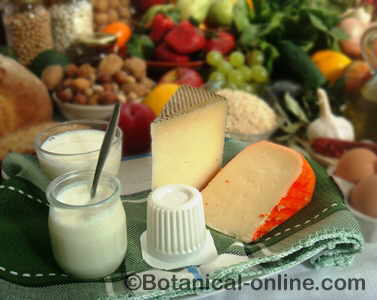
Photo of dairy
Excessive calcium intake (through supplements or excessive consumption of dairy products) can lead to calcium deposition in the kidneys, in an affectation known as milk-alkali syndrome. This can be aggravated by taking vitamin D supplements.
Milk-alkali syndrome usually occurs in people with osteoporosis, since they usually take calcium and vitamin D supplementation.
Diseases that calcium oxalate stones produce
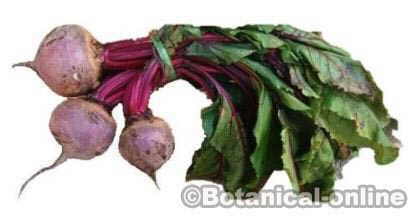
Beets are rich in oxalates
- Hyperoxaluria: In some people there is a greater intestinal absorption of oxalates, which increases the renal elimination and the formation of calcium oxalate crystals in the kidneys (hyperoxaluria). It must be differentiated from oxaluria, which is the normal elimination of oxalates. People with hyperoxaluria should avoid eating foods with many oxalates.
- Hyperparathyroidism: Diseases such as hyperparathyroidism (Too much parathyroid hormone (PTH) in the blood) increase the renal elimination of calcium and favor the formation of stones.
- Lack of movement or long convalescence: In other cases, the stones in the kidneys appear in sick people who have been immobilized for a long time, due to bone decalcification: patients with bone fractures, or in general any disease that prevents movement or involves a long convalescence.
Oxalates and intestinal flora
In addition to everything mentioned above, there are other factors that determine the excretion of calcium oxalate in the urine. For example, the intestinal flora (microbiota) is able to increase or decrease the absorption of oxalates. This will depend on the type of bacteria that each person has.
Therefore, if we do not eat oxalates. will we reduce the risk of kidney stones?
As explained, there are many causes of kidney stones and it can not be guaranteed that the ingestion of oxalates is a unique cause of this affectation, since there are many other more determining factors in the appearance of this disorder, as we have seen previously.
- Under normal conditions, the body is able to remove calcium oxalate crystals in the urine, so there are usually other factors that favor the appearance of stones, not just food.
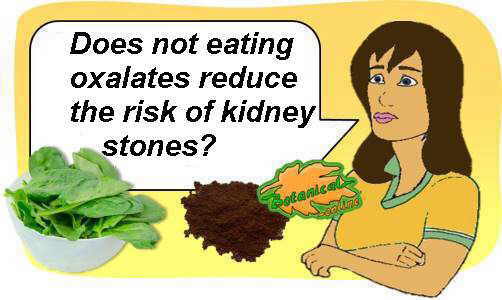
It is a very frequent question if the elimination of foods with oxalates from the diet reduces the likelihood of suffering kidney stones. The image shows spinach and pure cocoa, foods rich in oxalates. Does not eating oxalates reduce the risk of kidney stones? (Question answered below in the text)
Will eliminating oxalate-rich foods prevent kidney stones?
Eliminating oxalate-rich foods from the diet does not eliminate the risk of kidney stones. What is achieved by avoiding foods with oxalates is to reduce the total intake of oxalates in the diet and its absorption, which decreases oxaluria (calcium oxalate in urine) and the probability of stones in those cases where the cause of the stones is exclusively food
Why is it recommended to eliminate food with oxalates in case of stones?
When people have kidney stones they are recommended to eliminate foods with oxalates from their diet since these can further promote calcium deposition in the kidneys.
Should I stop eating spinach if I have never had stones?
If you have never had kidney stones, you can continue to take the normal amount of these foods that you usually consume.
* Related information:
![]() More information on oxalates.
More information on oxalates.

